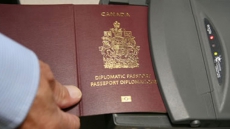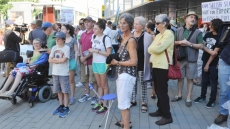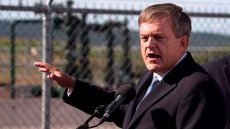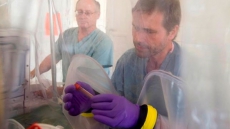VANCOUVER - Many parents and students in B.C. are relieved school is finally starting on Monday after three weeks of delay, and some say there is even a silver lining to the provincewide teachers strike.
Half a million students are going back to school after more than 40,000 of the province's public school teachers went on strike in June, shuttering classes for five weeks in two separate school years. Teachers and government reached a deal last week to end the job action.
Nicole Makohoniuk, president of the B.C. Confederation of Parental Advisory Councils, said more parents and guardians appear to be engaged with the education system as a result of the job action.
"There've been parents showing up to meetings in greater numbers, there've been parents writing letters, social media, sharing what they believe," Makohoniuk said. "It's been very exciting times for us."
Jing Wang, a Grade 12 student from Prince Of Wales Secondary, said the strike has increased students' awareness of the school system.
"From the dispute I think we've learned a little more about communication and about the B.C. education system," said the 16-year-old. "I did see quite a few more kids start getting a little more engaged."
Angelica Poversky, a Grade 11 student from a Vancouver-area suburb, appears to be one of those kids.
"I definitely am more aware of what’s going on and a lot of youth are more aware of what’s going on, which is definitely a positive," said Poversky, who attends McMath Secondary in Richmond.
The 16-year-old said the strike has made her more aware of the details of how schools are run, such as class size and support staff levels, key issues in the dispute.
Edward Le, a Grade 12 student at Sir Winston Churchill Secondary in Vancouver, said the strike has stirred up youth who were not interested in local politics.
"I feel that the strike when it hit so much at home for us young people — and the civic engagement it brings — would definitely be good for democracy and our society," the 17-year-old said.

But while some students have said they are relieved to be back in school, there are challenges that come with a shortened school year, especially for those who are eyeing post-secondary education.
Applications for colleges and universities are looming, and some students are concerned they've lost precious time that could have been used for polishing their admissions forms.
“As a senior student talking with my friends and classmates, there’s such a huge sense of worry in terms of 'will we get our applications in on time,'" Wang said. "Even if we get our applications in, how would we be looked at compared to students in other provinces?”
Wang said the delayed start of classes could stifle her chances of receiving some scholarships since applications are due as early as October and she's uncertain if her marks will be available that soon.
Poversky trying to get into Pearson College, which requires transcripts and teacher references to be submitted in the December of students' Grade 11 year, and she concerned she's lost valuable time that could've been used to acquire solid references.
"I'm definitely really worried about that," she said "We missed a lot of school."
But some schools said they will be do everything they can to accommodate B.C. students affected by the strike.
Dominic Ali, spokesman for the University of Toronto, said his school will work closely with B.C.'s Ministry of Education to figure out a solution to any potential problems.
"The University of Toronto will not disadvantage students who cannot present the usual required documents for reasons outside their control," he said in an email statement.
Kathleen Massey, the registrar for McGill University, said she will also be looking to B.C. school boards for guidance on admissions and added the post-secondary institution has been flexible with admitting students who missed class in June because of the strike.
Education Minister Peter Fassbender has said provincial exams may have to be rescheduled but classes will not be extended to make up for the three weeks of the new school year that teachers were on strike.
Depending on the district, classes are expected to start either Monday or Tuesday.
The new deal for teachers spans six years and includes a 7.25 per cent salary increase, improvements in extended health benefits and the teaching-on-call rates, as well as a $400 million education fund to hire specialist teachers.
It provides an additional $105 million to address retroactive grievances related to a B.C. Supreme Court ruling that found the province violated teachers' rights when the government stripped them of their ability to bargain for class size and support staff levels in 2002.

But aside from the grievance fund, there were no developments on class size and support, as both sides will take that debate to court.
The province is appealing the B.C. Supreme Court decision and a hearing is scheduled next month.
School support staff will also be back in class and about 46 per cent of the workers have also signed deals with the province giving them a 5.5 per cent wage increase over five years.
Within 30 days of ratification, the 15,600 workers who have signed agreements will get reimbursed for scheduled time they were not paid for during the strike.
Staff who have not signed agreements are working to do so by November.





